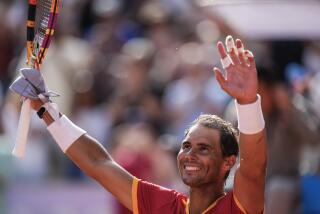Rising Star Serves Them Right
- Share via
Your name is Mario Ancic, you are 20 years old and you are standing in yet another international athletic spotlight thousands of miles from home. It shouldn’t come this easy, nor this often, but it has, even if you may not completely understand it.
You have already beaten Roger Federer on Center Court at Wimbledon at age 18, won an Olympic bronze medal in September after getting all the way to the Wimbledon semifinals in July, and are currently the 23rd-ranked tennis player in the world.
Now, on a Saturday night on a tennis court in a Los Angeles suburb, all you have to do is get one more point on your serve. That will put your Croatian Davis Cup team in a stunning 2-1 lead over the United States and its ace doubles team of Bob and Mike Bryan.
The stakes are tremendous. Usually, this doubles point leads to the match win, and you have one of the hottest players in the world, your partner, Ivan Ljubicic, in the leadoff match on Sunday. Plus, Davis Cup teams from Croatia aren’t supposed to beat Davis Cup teams from the mighty United States, especially when playing them in the U.S. And especially when the Americans are fielding a team with the No. 2 player in the world, Andy Roddick, and one of the best ever to play the game, Andre Agassi.
If you are Ancic, you are better off not thinking about it, not weighing the significance. At 20, you probably don’t.
Nothing comes easy. Until the last ball settles into the net, anything can happen.
The Bryans, Southern California twins who have won millions just concentrating on doubles, have yet to lose in five Davis Cup doubles matches. Not even a set.
And they have an enthusiastic, noisy home crowd in Carson, chanting and stomping and pounding drums and doing anything legally disruptive to keep you from doing what you need to do. As foreign as the Davis Cup concept remains to most American fans, they have learned quickly in Carson this weekend. It is the second day and the needle on the noise-and-fun meter has steadily climbed.
You and Ljubicic have survived a first-set loss and two set points against you in the second, including one when Mike Bryan was serving in a tiebreaker at 7-6. And it took you a fifth break point and a huge forehand down the middle by Ljubicic to get the break in the third set that put you in position to win the match in the fourth.
Now, serving at 5-4 and 40-love, it tightens. You have a face-to-face volley duel with Bob Bryan and lose. The score is 40-15.
You hit a 133-mph serve down the middle and it is called just long, and after you kick in your second serve, Bob Bryan catches you and Ljubicic at the net and flicks a perfect lob over your head that lands on the baseline. The score is 40-30 and the crowd is in a frenzy. Almost nobody is sitting.
You go back to serve, one more time, to Mike Bryan, the right-hander who plays the backhand side.
The stadium falls silent. Even in Davis Cup, there is a sense of tennis etiquette. The only sound is the drone of the engine from the blimp overhead.
You rock back, smooth as always, and send your 6-foot-5 frame up to get the toss, and send a 134-mph serve rocketing at Mike Bryan. It comes back, as it would in this kind of match, and you are ready. One-two-three steps toward the net, then stop.
Mike has done his best, but the return is floating high, through the middle, and with one huge slap shoulder high, you put the volley away and the hopes of the U.S. Davis Cup team for 2005 are severely jolted.
When you finish your winning volley, you are two steps away from your coach, Nikki Pilic, and so all that is left to do is turn in his direction, and the direction of the Croatian contingent in the seats behind him, and throw your arms in the air. Eventually, you will exchange high-fives with them all, including a white-haired man whose son, Goran Ivanisevic, is the most famous Croatian tennis player -- maybe athlete -- of all.
Later, in the news conference, the team veteran, 25-year-old Ljubicic, calls the win a “beautiful feeling.” You are asked to try to articulate the feelings in that last game, of the pressure and significance of the moment serving for the match. You try, but wisdom and perspective don’t come easily at 20.
” ... They broke me like in the second game,” you recall, “but from there on, we were really solid on our serves. And we want to just, you know, keep it simple. We both have big enough serves to win the game.”
News conference answers don’t matter. You have had a storybook moment, another one in what is likely to become a series over the next several years. You’ll be on “SportsCenter” tomorrow, the summit of Mt. Everest for most athletes.
And you probably don’t even know what that is.
More to Read
Go beyond the scoreboard
Get the latest on L.A.'s teams in the daily Sports Report newsletter.
You may occasionally receive promotional content from the Los Angeles Times.







